.jpg/_jcr_content/renditions/970.jpg)
Charting a new course through collaboration
Our story
Charting a new course through collaboration
The Poche SA & NT centre is focused on building healthy country, healthy communities and health leaders throughout Australia’s central corridor, across the Northern Territory and South Australia.
We are proud to have been founded within Flinders University as a result of the initiative of philanthropists Greg Poche AO, Kay Van Norton Poche and Reg Richardson.
Our focus is on improving health outcomes for Aboriginal and/or Torres Strait Islander people through collaborative, holistic and community-driven approaches.

Standing up together
Poche SA+NT stands out for the following attributes:
- Aboriginal-led: Poche SA+NT is uniquely driven and guided by Aboriginal leadership, ensuring that the perspectives and needs of Aboriginal and Torres Strait Islander communities are at the forefront of its initiatives.
- Guided by local Elders and a national network of eminent advisers: The centre benefits from the wisdom and guidance of local Elders as well as a distinguished group of advisers from across the country. This collective expertise ensures culturally informed decision-making and strategic direction.
- Firmly embedded within one of Australia's most innovative health research Universities: Poche SA+NT has a strong partnership with a cutting-edge health research university. This collaboration enables access to state-of-the-art resources, research capabilities, and academic excellence, enhancing its ability to drive positive change in Indigenous health.
- Close community links to provide insights into community priorities and opportunities: Poche SA+NT maintains close connections with the communities it serves. This engagement allows the organization to gain valuable insights into the unique priorities, challenges, and opportunities within those communities, ensuring that its initiatives are relevant and impactful.
- Sole focus on improving Aboriginal and Torres Strait Islander health outcomes through holistic initiatives: Poche SA+NT dedicates all its efforts and resources towards improving health outcomes for Indigenous populations. Its initiatives encompass holistic approaches that address not only physical health but also cultural, social, and emotional well-being, recognizing the interconnectedness of these factors in achieving positive health outcomes.
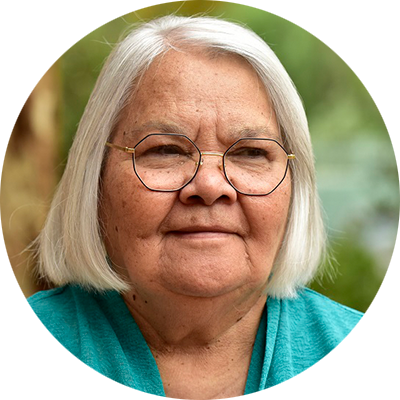
“In the old days, when Elders and adults would want you to come together and stand up for each other, they would put their hands together and show eight fingers. It was a kind of sign language. They didn’t need to say anything else – we needed to stand strong together.”
- Dr (Aunty) Pat Miller AO
About Poche SA+NT
Poche SA+NT operates in the Northern Territory and South Australia region, with nodes located in Tarntanya (Adelaide), Mparntwe (Alice Springs), and Garramilla (Darwin). Our primary focus is to facilitate community-led, innovative developments that strengthen the holistic health of Aboriginal and Torres Strait Islander communities.
We actively drive programs based on community priorities to provide support to Aboriginal and Torres Strait Islander communities, as well as the health sector, research organizations, and governments. Through strategic partnerships and collaborations, we foster education and research opportunities that empower self-determination and contribute to better support for Indigenous peoples in Australia and globally.
Poche SA+NT plays a crucial role in enabling swift improvements in the measurement and evaluation of health interventions. By enhancing the measurement and evaluation processes, we ensure that future health initiatives can be more precisely targeted and impactful.
Our approach to driving improved health outcomes involves supporting community-relevant research and policy development. By aligning our efforts with the specific needs and aspirations of communities, we strive to make meaningful and sustainable changes in the health landscape.
Poche SA+NT embraces the concept of walking in four worlds, which entails bringing together diverse perspectives, priorities, and understandings. This inclusive approach allows us to leverage the strengths of different stakeholders, fostering collaboration and achieving positive change at the intersection of Indigenous cultures, healthcare systems, research, and policy-making.

Poche SA+NT plays a crucial role in improving health outcomes of Aboriginal and Torres Strait Islander people by connecting researchers, government entities, and communities. We achieve this with:
- Providing support and guidance to Aboriginal and/or Torres Strait Islander health workers and leaders, fostering the development of a network of health leaders within Aboriginal and Torres Strait Islander communities.
- Facilitating the transformation of research findings into practical programs and projects that have a significant positive impact on the health and overall well-being of Aboriginal and/or Torres Strait Islander individuals and communities.
- Conducting research and promoting awareness of best practices aimed at enhancing health outcomes for Aboriginal and/or Torres Strait Islander communities. This involves exploring and disseminating knowledge about effective approaches in improving holistic health.
- Promoting two-way learning between Aboriginal and/or Torres Strait Islander individuals and non-Indigenous people, fostering a deeper understanding of culture and holistic health approaches. This mutual learning process aims to bridge the gap between different perspectives and promote a more inclusive and culturally sensitive healthcare system.
Poche SA+NT Staff
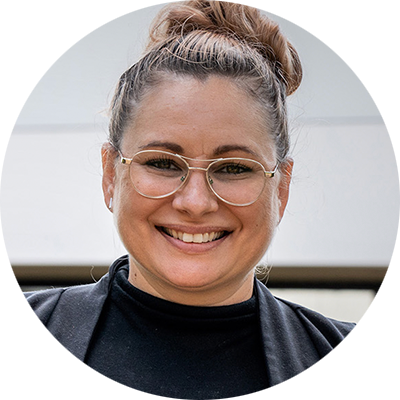
Associate Professor Kalinda Griffiths (FRSN)
Director
Kalinda is an epidemiologist who has worked in the research sector in a number of roles for over 25 years. Her interest is in empirically addressing complex health disparities in populations through existing population level data. Her research currently addresses issues of quality and the utilisation of data pertaining to Aboriginal and Torres Strait Islander people. Her areas of focus include the measurement of health disparities, with a particular focus on cancer, Indigenous Data Governance and building capabilities in Aboriginal and Torres Strait Islander health to support the next generation.
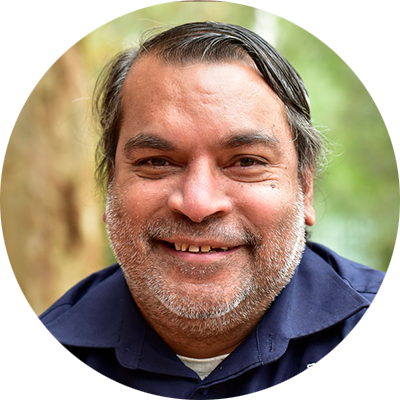
Senior Elder on Campus (Darwin)
Dr. Richard Fejo is a descendant of the Larrakia and Warumungu peoples and holds a great amount of cultural knowledge and experiences from both northern and central Australia. He served as the Chairman of the Larrakia Nation Aboriginal Corporation (LNAC) from 2018 to 2021. Richie worked as a Cultural Educator with Northern Territory General Practice Education for 11 years, resigning in 2020 to become the Flinders University Elder on Campus in Darwin and the Chairman of the Darwin Waterfront Corporation. From 2020 to 2022 Richie served in previous roles with City of Darwin International Relations Committee, standing down to become the current chairman of the Australia Day Council NT. In April 2023, Richard joined the national NDIA Board.

Senior Elder on Campus (Alice Springs)
Patricia was born and raised in Alice Springs, working with the Central Australian Aboriginal Legal Aid Service, commencing as a filing clerk and rising to the position of CEO, over a period of 35 years. Patricia is an Arrente/Allyuwerre woman and has served on a wide variety of boards and community organisations. She has been awarded honorary Doctorates by Flinders and Charles Darwin Universities.
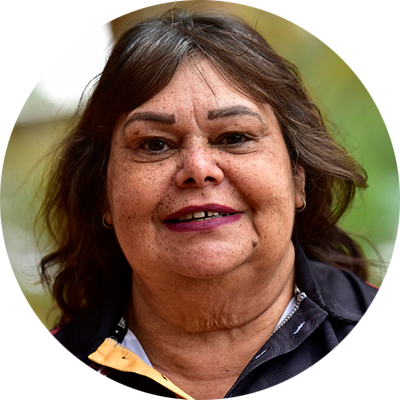
Lecturer in Aboriginal and Torres Strait Islander Health
Kath is an Arrente woman who has worked in Indigenous health for nearly 30 years. She has worked as an Enrolled Nurse across the NT, as a Senior Aboriginal Health Worker in WA. She has also delivered and developed training packages for AOD workers, Cross Cultural workshops & Aboriginal Health Worker Training. Kath has also held a range of community health roles across the NT. Kath is now a Lecturer in Aboriginal and Torres Strait Islander Health, teaching into the Northern Territory Medical Program in Darwin.
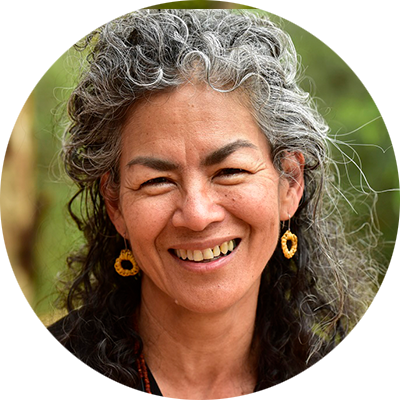
Poche Research Fellow
Lorna has a background in health, education and training and Indigenous health research. Lorna has worked in several research projects in Top End and in Central Australia. She has been involved in clinical research looking at episodes of staphylococcus aureus bacteraemia and a bronchiectasis study and has been involved in NT government program evaluations and has project managed a homelessness research project with Larrakia Nation Aboriginal Corporation (LNAC).

Education Support Officer
In her role as Education Support Officer, Jess has a key focus on education-based projects and the development of innovative approaches to teaching and learning. Jess has previously taught into and coordinated an Aboriginal and Torres Strait Islander health sciences topic, working in partnership with Aboriginal and Torres Strait Islander colleagues to co-design curriculum. She is also completing a PhD focusing on reflexivity as a core element of culturally safe healthcare and health policy.

Senior Support Officer
Pauline, originally from Alice Springs, has extensive experience working in rural and Indigenous communities. She joined Flinders University in 2012, where she held various roles in project management, finance, human resources, and employment. She worked as the Flinders NT Resources Administrator and later moved to the School of Health Sciences, providing operational support and executive assistance. Recently, she became a Senior Support Officer with Poche SA+NT, overseeing corporate support and managing projects and events.
John Rawnsley
Chair
John is the Manager of the Law and Justice section at the North Australian Aboriginal Justice Agency. Prior to this he worked in various legal roles and in leadership development. John is a Director and Deputy Chair of the Northern Territory PHN, a Director of Winkiku Rrumbangi NT Indigenous Lawyers Aboriginal Corporation and a member of the Law Council of Australia’s Indigenous Legal Issues Committee. He currently chair’s the Smith Family’s Aboriginal and Torres Strait Islander Advisory Group.
Shona Reid
Director
Shona is a proud Eastern Arrernte Woman, with a family legacy that extends into the Hart Ranges in the Northern Territory. However, she has lived and worked across South Australia for most of her life and regards South Australia as home.
Shona has devoted her knowledge, experience, professional and personal life to the advancement and rights of Aboriginal children, young people, families and communities for over two decades. For 15 years, she has worked across the child protection, young offending, and the out-of-home care sector, predominately in regional and remote areas, including the Anangu Pitjantjatjara Yankunytjatjara (APY) Lands. In recent years, she focused her expertise on governance and accountability across the APY and Far West Coast regions of South Australia. In early 2020 she was privileged to be the recipient of a Distinguished Alumni Award for service to Aboriginal Children, Young People, Families and Communities from Flinders University.
Prior to becoming the Guardian for Children and Young People, Shona was the CEO at Reconciliation SA and held various roles in public service including at the Legislative Council - Parliament of South Australia, Aboriginal Affairs and Reconciliation, Ministerial Offices, and various iterations of what is now the Department for Child Protection.
Shona also previously held positions on the SA Youth Centre Review Board (Youth Parole Board), South Australian Housing Trust Board of Management (Chairing the Aboriginal Advisory Committee in SAHA), Co-Chair of the Justice Re-Investment South Australia Board, and a Director on the board for Lutheran Community Care.
Shona is currently a member of Poche SA+NT Board, Director on the National Board of Winston Churchill Memorial Trust, and a member of the Rio Tinto Australian Advisory Group.
Britt Walker
Director
Britt has had a lengthy career in the public sector where she has worked with diverse stakeholder groups domestically and internationally to support and implement government programs. She is committed to human rights and social justice and is an advocate for philanthropic partnerships that bring tangible benefits.
Professor Jonathan Craig
Director
Jonathan is Vice-President and Executive Dean and Matthew Flinders Distinguished Professor of the College of Medicine and Public Health at Flinders University. He is a practising paediatric nephrologist and clinical epidemiologist, and especially committed to improving the health of people with chronic kidney disease, the health of children, and the health and well-being of Aboriginal and Torres Strait Islander peoples. He has co-led two large scale population based studies designed to improve the health trajectory of Aboriginal children. He is on a number of Commonwealth Department of Health expert panels (PBAC, MSAC and Life Saving Drugs Expert Panel).
Dr Ram Vemuri
Director
Ram has spent over 30 years working on several projects in Australia, the USA, Jordan, India, and Papua New Guinea, creating businesses in remote and regional areas. He is recognised as an interdisciplinary researcher who contributes internationally to applying economics to global, regional, national, and local issues. Ram is the current Editor in Chief of the International Journal of Behavioural and Health Care Research based on his work in health research in infection prevention, remote and regional health in the NT, as well as providing health policy advice in interphases between health, economy, leadership, and management in built and natural environments.
Erin Lew Fatt
Director
Erin is an Aboriginal woman from Darwin who has been working in the Aboriginal health sector for over 20 years. Erin is the Programs Manager at AMSANT, managing workforce policy, chronic disease workforce support, leadership and digital health. Erin is also a Board member with the Northern Territory General Practice Education (NTGPE) and the Remote Area Health Corp (RAHC).
Professor Tom Calma AO
Director
Tom is an Aboriginal Elder from the Kungarakan (Koong ara kan) tribal group and a member of the Iwaidja (Ee wad ja) tribal group whose traditional lands are southwest of Darwin and on the Cobourg Peninsula in the Northern Territory, respectively. He is the 2023 Senior Australian of the Year, Patron of the Poche Indigenous Health Centres, and has been involved in Indigenous affairs at a local, community, state, national, and international level for over 45 years. Tom is currently on a number of boards and committees focusing on rural and remote Australia, Indigenous tobacco control, health, mental health, suicide prevention, all levels of education, culture and language, justice reinvestment, health research, aged care, reconciliation, and economic development.
Associate Professor Kalinda Griffiths (FRSN)
Director
Kalinda is an epidemiologist who has worked in the research sector in a number of roles for over 25 years. Her interest is in empirically addressing complex health disparities in populations through existing population level data. Her research currently addresses issues of quality and the utilisation of data pertaining to Aboriginal and Torres Strait Islander people. Her areas of focus include the measurement of health disparities, with a particular focus on cancer, Indigenous Data Governance and building capabilities in Aboriginal and Torres Strait Islander health to support the next generation.
Ambassadors facilitate and support the goals of Poche SA+NT in the wider public. They assist in developing connections and partnerships in supporting Aboriginal and Torres Strait Islander research and education.
Ngaree Ah Kit, Member for Karama
Minister for International Education | Minister for Corporate and Digital Development | Minister for Disabilities | Minister for Multicultural Affairs
Ngaree Ah Kit is an Aboriginal and Torres Strait Islander woman from the Northern Territory. She has held the seat of Karama since 2016 and was previously the 13th Speaker of the Northern Territory Legislative Assembly, making her the first Aboriginal woman to hold the role of speaker in an Australian parliament. Ngaree is a strong advocate for health, wellbeing, and inclusion, and has made many contributions to her community and to Territorians more broadly, particularly through her work as a suicide prevention advocate.
Jerome Cubillo
Chief Executive Officer of the NT Indigenous Business Network | Director, Ironbark Aboriginal Corporation
Jerome is a Larrakia and Wadjigan man who was born and raised on Larrakia country. He holds a Bachelor of Arts (Major in Politics and Minor Development Studies) from the University of Melbourne. He has a diverse professional career, having worked in the NFP sector, the private sector, within the Northern Territory Government and now with an industry representative body that supports and advocates for Aboriginal owned businesses across the Northern Territory. Recently, Jerome was appointed as the Chief Executive Officer of the Northern Territory Indigenous Business Network (NTIBN). He is keen to grow the membership of Aboriginal owned and operated business across the Northern Territory and advocate on their behalf across all levels of government and industry.
Thomas Mayo
National Indigenous Officer, Maritime Union of Australia (MUA) & Author
Thomas Mayo is National Indigenous Officer of the Maritime Union of Australia (MUA) and author who is a prominent advocate for the Uluru Statement and workers’ rights. After working on the wharves for more than a decade, he became a union official with the MUA, an author of four books and a signatory to the Uluru Statement from the Heart. Thomas was entrusted to carry the sacred canvas of the Uluru Statement from the Heart for 18 months around the country, gathering support for a constitutionally enshrined First Nations voice, and a Makarrata Commission for truth-telling and agreement-making. Thomas has been appointed as a Poche SA+NT Ambassador in recognition of his significant contribution to understanding Indigenous leadership in health.
Stuart McGrath
Aboriginal health practitioner | NT State Recipient Young Australian of the Year 2021
Stuart McGrath is an Aboriginal health practitioner and is set to become the first Yolngu registered nurse. Stuart’s life experiences give him special insight into the needs of different community groups – from his upbringing in remote Indigenous communities, to schooling in Canberra and studying in Darwin. Stuart has overcome significant challenges to follow his dreams, including completing his first year of a Bachelor of Nursing degree remotely while working full-time and being a father to two young girls. He helped produce the ‘Ask the Specialist’ podcast, with the Menzies School of Health Research, to improve communication between health professionals and patients. A natural leader, Stuart is committed to closing the gap between Indigenous and non-Indigenous Australians. His passion for helping his community will inspire other First Nations young people to participate in the health workforce, leading to happier and healthier lives.
Distinguished Alumni are Aboriginal and/or Torres Strait Islander graduates of Flinders University who are making significant contributions to the health and wellbeing of Aboriginal and Torres Strait Islander people and communities.
Leanne Liddle
Director, Aboriginal Justice Unit | Northern Territory 2022 Australian of the Year
Arrernte woman Leanne Liddle is committed to providing Indigenous Territorians with justice solutions that will work for them. She is the driving force behind the Northern Territory Aboriginal Justice Agreement, which, in partnership with Aboriginal people, aims to reduce incarceration rates, increase Aboriginal leadership and improve justice outcomes for First Nations Territorians. As Director of the Aboriginal Justice Unit, she has travelled thousands of kilometres to meet with and listen to First Nations communities across the Northern Territory. Leanne was South Australia’s first Indigenous policewoman. During her decade of service she experienced racism and abuse which fuelled her determination to make a difference. She completed a law degree and worked for the United Nations, and in several high-profile government roles, before joining the newly formed Aboriginal Justice Unit in 2017.
We have a range of projects and programs that we support and lead in.
Below are a few of the ongoing projects that cover off on workforce development, genomics, cancer as well as data and measurement that are driving Aboriginal and Torres Strait Islander self-determination and health. Please get in contact with us for further information.
Kalinda publications (June 2021 – May 2023)
Chan, J., Griffiths, K., Turner, A., Tobias, J., Clarmont, W., Delaney, G., Hutton, J., Olson, R., Penniment, M., Bourque, J-M., Brundage, M., Rodin, D., Slotman, B. & Yap, M. L. (2023). Radiation therapy and Indigenous peoples in Canada and Australia: Building paths toward reconciliation in cancer care delivery. International Journal of Radiation Oncology, Biology, Physics, 116(12), p. 421-429. DOI: 10.1016/j.ijrobp.2022.09.085
Clifford, S., Wright, C. J., Livingston, M., Smith, J. A., Griffiths, K. E. & Miller, P. G. (2023). Experiences of trauma and alcohol and other drug use by domestic, family, and sexual violence offenders: A review of 6 months of sentencing remarks from the supreme court of the Northern territory, Australia. Journal of Criminology, 56(1), p. 78-97. DOI: 10.1177/26338076221129920
Clifford, S. & Griffiths, K. E. (2023). Identifying Aboriginal and Torres Strait Islander offenders and victims in judicial sentencing remarks. Journal of Criminology, 0(0), p.263380762211408. DOI: 10.1177/26338076221140897
Sitas, F., Short, G., Brooke, M. & Griffiths, K. (2023). Smoking and vaping on death notification forms in Australia: Improving the reporting of preventable risk factors. Health Promotion Journal of Australia. DOI: 10.1002/hpja.703
McGuffog, R., Chamberlain, C., Hughes, J., Kong, K., Wenitong, M., Bryant, J., Brown, A., Eades, S. J., Griffiths, K. E., Collis, F., Hobden, B., O'Mara, P., Ridgeway, T., Walter, M. & Kennedy, M. (2023). Murru Minya – informing the development of practical recommendations to support ethical conduct in Aboriginal and Torres Strait Islander health research: a protocol study for a national mixed-methods study. MBJ Open, 13(2), p. e067054. DOI: 10.1136/bmjopen-2022-067054
Johnston, M., Smith-Vaughan, H., Bowman-Derrick, S., Hopkins, J., McCrory, K., Collins, R., Marsh, R., Griffiths, K. & Mayo, M. (2022). Building health workforce capacity in Northern Australia. Microbiology Australia, 43(3), p. 93-97. DOI: 10.1071/MA22031
Ring, I. T. & Griffiths, K. (2022). Life expectancy for Indigenous people is improving, but closing the gap remains unacceptably slow. Medical Journal of Australia, 217(1), p. 26-27. https://doi.org/10.5694/mja2.51606
Miller, P., Coomber, K., Smith, J., Livingston, M., Stevens, M., Guthridge, S., Room, R., Wright, C. J. C., Rung, D., Clifford, S., Baldwin, R., Das, S., Paradies, Y., Scott, D., Griffiths, K. E., Farmer, C., Mayshak, R., Silver, B., Moore, S., Mack, J., Mithen, V., Dyall, D., Ward, J., Boffa, J. & Chikritzhs, T. (2022). Learning from alcohol (policy) reforms in the Northern Territory (LEARNT): protocol for a mixed-methods study examining the impacts of the banned drinker register. BMJ Open, 12(4), p. e058614. DOI: 10.1136/bmjopen-2021-058614
Trudgett, S., Griffiths, K., Farnbach, S. & Shakeshaft, A. (2022). A framework for operationalising Aboriginal and Torres Strait Islander data sovereignty in Australia: Results of a systematic literature review of published studies. eClinicalMedicine, 45, p. 101302. OI: 10.1016/j.eclinm.2022.101302
Griffiths, K., Diaz, A., Whop, L. J. & Cunningham, J. (2021). The health and wellbeing of indigenous and tribal peoples around the globe: ensuring and promoting best practice in research. International Journal of Environmental Research and Public Health, 19(1), p. 261. DOI: 10.3390/ijerph19010261
Clifford, S., Smith, J. A., Livingston, M., Wright, C. J. C., Griffiths, K. E. & Miller, P. G. (2021). A historical overview of legislated alcohol policy in the Northern Territory of Australia: 1979-2021. BMC Public Health, 21(1), p. 1921. DOI: 10.1186/s12889-021-11957-5
Green, M., Cunningham, J., Anderson, K., Griffiths, K. & Garvey, G. (2021). Measuring health care experiences that matter to Indigenous people in Australia with cancer: identifying critical gaps in existing tools. International Journal for Equity in health, 20(1), p. 100. DOI: 10.1186/s12939-021-01433-2
Stacey, I., Hung, J., Cannon, J., Seth, R. J., Remenyi, B., Bond-Smith, D., Griffiths, K., Sanfilippo, F., Carapetis, J., Murray, K., Katzenellenbogen, J. M. & Bäck, M. (2021). Long-term outcomes following rheumatic heart disease diagnosis in Australia. European Heart Journal Open, 1(3), p. oeab035. DOI: 10.1093/ehjopen/oeab035
Griffiths, K., Blain, J., Vajdic, C. M. & Jorm, L. (2021). Indigenous and tribal peoples data governance in health research: A systematic review. International Journal of Environmental Research and Public Health, 18(19), p. 10318. DOI: 10.3390/ijerph181910318
Ring, I. & Griffiths, K. (2021). Australian Aboriginal and Torres Strait Islander health information: progress, pitfalls, and prospects. International Journal of Environmental Research and Public Health, 18(19), p. 10274. DOI: 10.3390/ijerph181910274
Green, M., Cunningham, J., Anderson, K., Griffiths, K. & Garvey, G. (2021). Measuring cancer care experiences of Aboriginal and Torres Strait Islander people in Australia: Trial of a new approach that privileges patient voices. Patient Experience Journal, 8(2), p. 43-57. DOI: 10.35680/2372-0247.1585
Griffiths, K., Ring, I., Madden, R. & Pulver, L. J. (2021). In the pursuit of equity: COVID-19, data and Aboriginal and Torres Strait Islander people in Australia. Statistical Journal of the IAOS, 37(1), p. 37-45. DOI: 10.3233/SJI-210785
Connolly, M., Griffiths, K., Waldon, J., King, M., King, A. & Notzon, F. C. (2021). Overview: the international group for indigenous health measurement and COVID-19. Statistical Journal of the IAOS, 37(1), p. 19-24. DOI: 10.3233/SJI-210793
Smith, J. A., Griffiths, K., Nash, R., Elmer, S., Ireland, S., Wright, C. J. C. & Gupta, H. (2021). Equity and health literacy: Using emerging evidence to inform the development of the National Preventative Health Strategy. Health Promotion Journal of Australia, 32(S1), p. 3-4. DOI: 10.1002/hpja.446
Lorna publications
Mathew, S., Fitts, M. S., Liddle, Z., Bourke, L., Campbell, N., Murakami-Gold, L., Russell, D. J., Humphreys, J. S., Mullholand, E., Zhao, Y., Jones, M. P., Boffa, J., Ramjan, M., Tangey, A., Schultz, R. & Wakerman, J. (2023). Telehealth in remote Australia: a supplementary tool or an alternative model of care replacing face-to-face consultations? BMC Health Services Research, 23(1), p. 341. DOI: 10.1186/s12913-023-09265-2
Russell, D., Mathew, S., Fitts, M., Liddle, Z., Murakami‑Gold, L., Campbell, N., Ramjan, M., Zhao, Y., Hines, S., Humphreys, J. S. & Wakerman, J. (2021). Interventions for health workforce retention in rural and remote areas: a systematic review. Human Resources for Health, 19(1), p. 1-103. DOI: 10.1186/s12960-021-00643-7
Fitts, M. S., Humphreys, J., Dunbar, T., Bourke, L. Mulholland, E., Guthridge, S., Zhao, Y., Jones, M. P., Boffa, J., Ramjan, M., Murakami-Gold, L., Tangey, A., Comerford, C., Schultz, R., Campbell, N., Mathew, S., Liddle, A., Russell, D. & Wakerman, J. (2021). Understanding and responding to the const and health impact of short-term health staffing in remote and rural Aboriginal and Torres Strait Islander community-controlled health services: a mixed methods study protocol. BMJ Open, 11(8), p. e043902. doi:10.1136/bmjopen-2020-043902
Bourke, L., Dunbar, T. & Murakami-Gold, L. (2020). Discourses within the roles of Remote Area Nurses in Northern Territory (Australia) government-run health clinics. Health and Social Care in the Community, 29(5), p. 1401-1408. DOI: 10.1111/hsc.13195
Dunbar, T. Bourke, L. & Murakami-Gold, L. (2019). More than just numbers! Perceptions of remote area nurse staffing in Northern Territory Government health clinics. Australian Journal of Rural Health, 27(3), p. 245-250. DOI: 10.1111/ajr.12513
Wakerman, J., Humphreys, J., Russell, D., Guthridge, S., Bourke, L., Dunbar, T., Zhao, Y., Ramjan, M., Murakami-Gold, L. & Jones, M. P. (2019). Remote health workforce turnover and retention: what are the policy and practice priorities? Human Resources for Health, 17(1), p. 99. DOI: 10.1186/s12960-019-0432-y
Jess publications
Dawson, J., Laccos-Barrett, K., Hammond, C. & Rumbold, A. (2022). Reflexive practice as an approach to improve healthcare delivery for Indigenous peoples: A systematic critical synthesis and exploration of the cultural safety education literature. International Journal of Environmental Research and Public Health, 19(11), p. 6691. DOI:10.3390/ijerph19116691
Dawson, J., Augoustinos, M., Sjoberg, D., Canuto, K., Glover, K. & Rumbold, A. (2020). Closing the Gap: Examining how the problem of Aboriginal and Torres Strait Islander disadvantage is represented in policy. The Australian Journal of Social Issues, 56(4), p. 522-538. DOI: 10.1002/ajs4.125
- Michael Johnston. ‘The Future of Education Equity in Remote Australia’. Charles Darwin University.
- Samantha Ludwig. ‘First Nations Peoples Cancer Survivorship in the Northern Territory.’ The Batchelor Institute.
- Sarah Clifford. ‘The effect of alcohol restrictions on violence against women in the Northern Territory.’ Charles Darwin University.
- Fiona Shalley. ‘Identity Statistics: The challenge of minority population identification to demographic methods.’ Charles Darwin University.
- Madeline News. ‘Exploring women's health policy and its implications for Aboriginal self-determination.’ UNSW.
- Lorna Murakami-Gold. ‘What is a good life? What does ‘Yanangu’ concepts of ‘Kurrunpa Wanka’ (a good life) mean for patients and their families living with renal dialysis?’. Flinders University
- Jess Dawson. ‘Exploring the potential role of reflexive practice and cultural safety in reducing racism’. The University of Adelaide
Workforce Development
CRESTA
The Centre of Research Excellence for Strengthening Primary Health Care (PHC) in Remote Australia provides a sustainable platform for focused research, capacity building, strengthened collaborations and research translation of evidence that optimises the remote health workforce, ensures enhanced governance and promotes equitable funding of essential PHC services.
Lead organisation: Menzies School of Health Research
Funder: NHMRC
Ramaciotti Regional and Remote Health Sciences Training Centre
The Ramaciotti Regional and Remote Health Sciences Training Centre (Menzies-Ramaciotti Centre) is developing a local, and Aboriginal and Torres Strait Islander health workforce in the Northern Territory (NT). The NT has a costly reliance on an interstate health workforce and limited opportunities for NT youth. The Menzies-Ramaciotti Centre supports youth into education and training pathways from school through to employment in the NT health workforce.
Lead organisations: Menzies School of Health Research and Flinders University
Funders: Ramaciotti Foundations, Bridging the Gap Foundations, Ian Potter Foundation
National Indigenous STEM Professional Network
The National Indigenous STEM Professional Network aims to promote and build capabilities, with mentoring at the core. The Network provides a forum to share, facilitate success, and to collaborate on and advance the work, research, Knowledges, and practices of Aboriginal and Torres Strait Islander Elders, Knowledge Keepers, practitioners, academics, and students.
Lead organisation/s:
Funders: UTS, RMIT, Griffith University, University of Sydney, ATSIMA, Science & Technology Australia, Australian Academy of Science, ATSE, ARC Centre of Excellence for Australian Biodiversity & Heritage, WEHI, THEISS
National Network for Aboriginal and Torres Strait Islander Health Researchers
The National Aboriginal and Torres Strait Islander Research Network was established to bring together the unique skills and knowledges of Aboriginal and Torres Strait Islander health researchers to address the health priorities of Aboriginal and Torres Strait Islander people and communities. The Research Network provides support to Aboriginal and Torres Strait Islander health researchers, and facilitates linkages between researchers, mentorship, advocacy, knowledge translation, and builds capacity and capability.
Lead organisation/s:
Funder: NHMRC
Central Australia Academic Health Science Network (CAAHSN)
The goal of CAAHSN is to drive transformative change through integrating Aboriginal and Western knowledges and uniting a growing network of partnerships between local health services, universities, community groups, peak professional bodies, and governments. This will be driven by work across four research streams: Translating culture through research; Health services and workforce capacity; Chronic diseases; and Impact.
Lead organisation: Central Australia Aboriginal Congress
Funder: MRFF
Genomics
CONNECT
Respecting the Gift – Empowering Indigenous Communities in Genomic Medicine (CONNECT) is developing national Indigenous genomics architecture at the interface of genomic science, health research, health care delivery, data sciences, ethics, policy and Indigenous knowledge systems. It centres and empowers Indigenous people to lead genomic research for the benefit of all Australians.
Lead organisation: ANU
Funder: NHMRC
Addressing emerging ethical, legal and social issues in governance of clinical and genomic datasets, to improve health
This project addresses key emerging ethical, legal and social issues in clinical and genomic dataset governance. It is working to develop, test and prepare for implementation a national genomic data governance framework. This framework will draw on relevant principles (including FAIR and CARE principles), reflect current and emerging genomic technologies, account for diversity in genomic data, and recognise emerging data sharing practices such as patient-led approaches and open science.
Lead organisation: University of Sydney
Funder: MRFF
ALIGN
The Australian Alliance for Indigenous Genomics (ALIGN) is establishing a National Indigenous Genomics Network that synergistically builds and extends Indigenous leadership and involvement in genomic science, research, precision health care, data sciences, ethics and Indigenous knowledge systems to reduce health inequality among Australia’s First Peoples.
Lead organisation: ANU
Funder: MRFF
Cancer
TACTICS
This Centre for Research Excellence works to improve cancer outcomes for Aboriginal and Torres Strait Islander people and their communities through Indigenous‐led, innovative, high‐quality, applied research, aimed at improving a broad range of cancer‐related health services. Our national and international collaborations actively promote the translation of research knowledge, to improve health policy and practice, and builds research capacity through training the next generation of researchers in Aboriginal and Torres Strait Islander cancer control.
Lead organisation: University of Queensland
Funder: NHMRC
Cervical Screening
This project will fast-track the elimination of cervical cancer in Australia by identifying and addressing persistent barriers to access to proven cervical cancer prevention services in primary health care. This project is creating a novel health equity digital navigation tool to generate and share this data on local populations that can be immediately actioned by primary health care providers, consumers, and other end users across Australia.
Lead organisation: UNSW
Funder: MRFF
First Nations Cancer Cohort Study
This project establishes a prospective population-based cohort of First Nations peoples diagnosed with cancer and their caregivers. It has a mixed-method study design incorporating comprehensive data linkage, patient-reported measures and Yarning to privilege the voices of First Nations patients and their caregiver/s. This work will critically inform future practice and service improvements in cancer care.
Lead organisation: University of Queensland
Funder: MRFF
Development and implementation of culturally safe lung cancer screening program with Aboriginal Community Controlled Organisations in Victoria.
To improve screening rates, it is critical that a lung cancer screening program is culturally safe for Aboriginal and Torres Strait Islander people. Currently no lung cancer screening programs have been created specifically for Aboriginal and Torres Strait Islander people. This project aims to develop and implement a lung cancer screening pilot program in two Aboriginal Community Controlled Organisations (ACCOs) in Victoria. If successful, this program could then be expanded to wider settings, and other states to improve lung cancer outcomes across Australia.
Lead organisations: Victorian Comprehensive Cancer Centre Alliance & Victorian Aboriginal Community Controlled Organisation
Funder: VCCC
Data and Measurement
ATLAS+
The ATLAS+ project aims to deliver the largest connected Indigenous primary care surveillance network in Australia, increasing the capacity of Aboriginal Community-Controlled Health Organisations (ACCHOs) and other primary health care services to provide high quality, evidence-based, best practice clinical care.
Lead organisation: University of Queensland
Funder: MRFF
Aboriginal and Torres Strait Islander Excess Mortality
This project will assess excess mortality associated with the COVID-19 pandemic. It aims to provide a standardized approach for comparing observed mortality data to expected mortality, enabling accurate estimation of the impact of COVID-19 on Aboriginal and Torres Strait Islander health outcomes.
Lead organisation: Flinders University
Funder: TBA
Humanities and Social Sciences Research Data Commons and Indigenous Research Capability
Representing Aboriginal and Torres Strait Islander researchers, organisations and communities across Australia, this project will review and refine national and international frameworks of Indigenous Data Governance (IDG) and Indigenous Data Sovereignty (IDS) to collectively strengthen the foundations of Aboriginal and Torres Strait Islander data governance principles, of which will be translated and applied to Indigenous research data tools and infrastructure. The Indigenous Data Network (IDN) will deliver an Indigenous research capability program that celebrates, supports and enhances the capabilities of Aboriginal and Torres Strait Islander peoples and researchers at the interface of research data science and Indigenous knowledge systems.
Lead organisation: University of Melbourne
Funder: Australian Research Data Commons
Education
Aboriginal and Torres Strait Islander Art-Led Learning (ALL) Pilot Project
The Aboriginal and Torres Strait Islander Art-Led Learning Pilot Project aims to support educators delivering higher education content which centres Aboriginal and Torres Strait Islander knowledges, perspectives, and experiences. To achieve this, the ALL Pilot Project developed a pedagogical approach and series of structured learning packages that educators can use to facilitate deeper student engagement with challenging and confronting content.
Lead organisations: Poche SA+NT and Flinders University Museum of Art
Funder: Flinders University College of Medicine and Public Health
Menzies Ramaciotti Regional and Remote Training Centre
The Ramaciotti Regional and Remote Health Sciences Training Centre, also known as the Menzies-Ramaciotti Centre, is dedicated to cultivating a local, culturally diverse, and empowered health workforce, specifically targeting Aboriginal and Torres Strait Islander individuals, within the Northern Territory (NT). Currently, the NT faces the challenge of high dependence on costly interstate health professionals, while local youth have limited prospects for pursuing careers in the health sector.
The Menzies-Ramaciotti Centre addresses this issue by actively supporting young individuals in the NT to embark on education and training pathways that lead to employment within the NT health workforce. By providing comprehensive assistance, from school to vocational education and beyond, the centre facilitates the transition of NT youth into fulfilling careers in healthcare.
This partnership creates opportunities for the local NT population and aims to establish a sustainable and locally grounded health workforce, fostering a sense of ownership and cultural responsiveness in delivering healthcare services. By nurturing and empowering Aboriginal and Torres Strait Islander youth, the Menzies-Ramaciotti Centre contributes to building a resilient and skilled health workforce that can better address the unique needs of the NT community.
Hoops 4 Health
Hoops 4 Health teaches lessons about health, leadership, and resilience through yarns, drills, and lessons around the basketball court.
After 20 years of delivering the program to thousands of children in northern Australia, Hoops 4 Health has partnered with Flinders University’s Aboriginal-led health centre, Poche SA+NT, to expand the reach of the program and establish new approaches to program measurement and evaluation.
The partnership will help train Aboriginal and Torres Strait Islander young people as health leaders and broaden the impact of the popular basketball-based program.

Contact us
We are proudly a part of Flinders University and the Poche Indigenous Health Network, with a goal of facilitating change through new approaches to collaboration and research translation.
We are Poche SA+NT.
You can be too.
Please contact us about building your research and/or education capabilities.
Our locations
Bedford Park
Level 7 HMRB (Health & Medical Research Building)
Station Road, Bedford Park SA 5042
Flinders University
GPO Box 2100 | Adelaide SA 5001
Alice Springs
Centre for Remote Health
Cnr Simpson and Skinner Streets,
The Gap NT 0870
PO Box 4066 | Alice Springs NT 0871
Darwin
Yellow Building 4
Corner University Drives North & West
Charles Darwin University, Casuarina NT 0810
PO Box U362 | Casuarina NT 0815
![]()
Sturt Rd, Bedford Park
South Australia 5042
South Australia | Northern Territory
Global | Online
CRICOS Provider: 00114A TEQSA Provider ID: PRV12097 TEQSA category: Australian University








